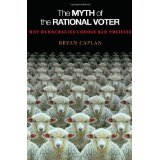Up until the previous posts in this series, I’ve simply done my best to try to accurately explain the views of Jeffrey Friedman, as he laid them out in his final book Power Without Knowledge: A Critique of Technocracy. While I agree with much of what he writes, there are specific points where I think he falls short.
I alluded to one such area in my previous post – I think he overstates his criticisms of both rational ignorance, as well as Bryan Caplan’s model of rational irrationality. The first flag for me is what I call the “unnecessary ‘or’” – it’s not always the case that a phenomenon always comes down to one explanation or another. One of Friedman’s chapters is titled “Public Ignorance: Radical, Not Rational” – but why must we say people are either radically ignorant or rationally ignorant, or, indeed, rationally irrational? I think all three of these models can be useful to explain different behavior in different circumstances. While I think Friedman does argue successfully for a greater role for radical ignorance, I’m not convinced it’s the one and only method for understanding human behavior and choice.
He also seems to apply much stricter standards to evaluating rival models of behavior than he does to his own. For example, when criticizing the idea of rational ignorance as described by Ilya Somin in his book Democracy and Political Ignorance, Friedman displays complicated mathematical equations calculating costs and benefits of political information and asks if we can really believe “billions of citizen-technocrats have been explicitly making calculations of the following sort to determine, respectively, whether they should vote and whether they should acquire political information…even though these formulae did not appear in print until 2013 (in Somin’s Democracy and Political Ignorance).”
Friedman briefly acknowledges that writers like Somin and Jason Brennan suggest that voters need only implicitly understand the low odds of casting a tie breaking vote, without needing to do the complex math, but he rejects this idea. But in laying out his own theories, Friedman often describes them in terms of implicit understanding, tacit assumptions, and unconscious biases and thought processes, none of which require the kind of explicit attitudes he insists rival theories embody. For example, when he forms his theory of citizens holding to a simple society ontology, he says that “none of these elements would normally operate at the explicit or conscious level.” He also says people acting according to a naively realistic worldview “may not, and probably do not in most cases, understand themselves to be doing this” and may even be unaware of “subscribing to a worldview in the first place.” It seems to me that if Friedman allows for this kind of implicit, tacitly understood reasoning to operate in his models, he should be willing to grant that to other theories as well.
This shortcoming is most apparent in Friedman’s criticism of Bryan Caplan’s model of rational irrationality. According to Friedman, rational irrationality means voters start off by knowing what’s true, decide that acting on true information isn’t worth it, and therefore deliberately choose to believe what they know to be false for the sake of emotional gratification. This model, Friedman says, means that voters “are aware of, but averse to, the manifest truth,” and in the endnotes to the book, Friedman also claims “the ‘rational’ component of ‘rational irrationality’ entails the incoherent claim that voters believe that their beliefs are false.”

But this is a serious misunderstanding on Friedman’s part. Rational irrationality doesn’t mean voters believe they hold false beliefs. As Caplan himself emphasizes in his book The Myth of the Rational Voter, “rational irrationality does not require Orwellian underpinnings [such as doublethink]…Above all, the steps should be seen as tacit…There is no need to posit that people start with a clear perception of the truth, then throw it away. The only requirement is that rationality remain on ‘standby,’ ready to engage when error is dangerous.” Yet, Friedman goes on to posit the very thing Caplan explicitly called out to not be posited. Contra Friedman, the “rational” aspect of rational irrationality doesn’t mean voters explicitly decide their false beliefs are worth holding, despite knowing them to be false. It only means that voters don’t bother to question if their currently existing beliefs are worth reevaluating, when they act in their capacity as voters.
While I think Friedman is right that people are too quick to declare things “obvious” or “self-evident,” particularly in the face of widespread disagreement about what’s supposed to be obvious, he seems to take that further than I’d be willing to grant. Too many people conflate “X seems obvious to me” with “X is self-evident”, and it’s important to realize that these are very different statements. But Friedman seems to hold a standard so strict that pretty much nothing can clear the self-evident bar. He says “Only a universal consensus among all rational observers” would suffice to make something self-evident, and even then, this doesn’t give us reason to suppose it’s true, because “People may universally err. But if they universally agree, it is at least possible that what explains the consensus is the self-evidence of their shared conclusion. If they do not agree, self-evidence is logically impossible.”
If something can only be self-evident if it’s universally agreed to, then nothing is self-evident. The law of noncontradiction? Not self-evident. 2+2 = 4? Not self-evident. Friedman does allow himself some wiggle room by saying the universal consensus must be among rational observers, but he doesn’t give any details about what makes an observer count as rational in this context. Is the law of noncontradiction not self-evident, because rational observers like Graham Priest dispute it? Or is Graham Priest not a rational observer, because he disputes a self-evident truth like the law of noncontradiction? I have no idea how Friedman would answer this.
Friedman’s alternative to technocracy, an exitocracy supplemented by wide-scale income redistribution, seems questionable to me. He makes a persuasive case for the superiority of exitocracy over technocracy, and his explanation for how minimally regulated markets best facilitate exit is very well put. But his income redistribution argument falls short. He says, “if the experimentation promised by the exit option is to be possible for more than the rich, economic redistribution is called for.” But in his arguments for the superiority of exit-based options over technocratic, voice-based options, he cites multiple examples of exit being successfully used to this effect by the global poor – so the benefits of exit already are available to more than the rich, at least when those exit options aren’t being blocked by technocratic policy.
His exitocracy would also dismantle the vast majority of economic regulations, because “voice-based macros solutions” will “necessarily block exit-based micro-solutions.” So an exitocracy, even without income redistribution, would remove a huge amount of technocratic regulation which currently has the effect of blocking people from utilizing exit to improve their situation, making exit even more effective than the examples he cites.
However, Friedman’s goal with income redistribution isn’t to merely improve the options for the poor by removing the mass of technocratic policies blocking their exit options. He seeks to maximize the available options of the least well-off person – hence his call for income redistribution to be arranged along John Rawls’ difference principle. Rawls recognized that attempts to equalize outcomes too aggressively could result in a situation where the least well-off person might end up worse off than a society with greater inequality but a higher floor. Similarly, Friedman recognizes that income redistribution that is too aggressive might reduce exit opportunities for the poor by preventing the creation of new entrance opportunities for them. But this only tells us what Friedman would aim for – he doesn’t give any details on how it would be achieved. How are we to know what level of income redistribution would meet his exit-based maximin goal? It seems like the only way to answer that question is by appealing to the kind of technocratic knowledge that Friedman had spent hundreds of pages arguing is unachievable.
Despite these and other flaws, I would still highly recommend the book. While I’ve spent a total of ten posts discussing it, many of the ideas and arguments it contains were left out. As just one example, Friedman devotes an entire chapter to a deep dive into the debate over social complexity and its implications between Walter Lippmann and John Dewey. It’s fascinating intellectual history (and caused me to pick up some of Lippmann’s work!), but I had to pretty much ignore that entire section for the sake of brevity – or at least, my attempt at brevity. No matter who you are, this is a book you can learn from, and find your views challenged by. To me, there is no higher endorsement than that.
Kevin Corcoran is a Marine Corps veteran and a consultant in healthcare economics and analytics and holds a Bachelor of Science in Economics from George Mason University.
















